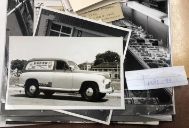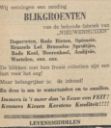Packed in Holland Leiden
On the label we find an English text: ‘Packed in Holland Leiden’. What is this English text doing on a label of a typical Leiden company?
Economic progress at the end of the 19th century made it so that many products which were only affordable for the rich before, now became available to a bigger part of society. Manufacturers and shop owners started advertising to this new group of consumers. Newspapers, signboards, shop windows and cars, amongst others, all started displaying advertisements (fig. 1). Manufacturers created a brand by packaging their products in a unique way and labeling them with their name. For example, the grocer used to have coffees of varying quality on offer, but now customers would simply choose the brand they enjoyed the most. The brand on the label became the most important, and consumers had to be convinced by the brand to buy its product.
The labels specially designed by Nieuwenhuizen (like the green bean can in fig. 2) were picked up by both consumers and shop owners, which is clear from the advertisement from the Surinamese newspaper Het Nieuws from 1949 (fig. 3). There, the canned vegetables are praised by a local shop owner: “Those cans with their beautiful labels are a sight for sore eyes!”
Nieuwenhuizen started out as a small family business, but by 1966 it had grown to be an international company that operated far beyond the Netherlands. Advertisements were not only visible in the Netherlands, but on cars in Singapore (fig. 1) and in Surinamese newspapers as well (fig. 3).
The labels had to be adapted accordingly to fit this new international image. That is where the English text ‘Packed in Holland Leiden’ comes from.
But that is not the only evidence for this company’s international allure…

](https://micrio.thingsthattalk.net/pVhfc/views/max/128x128.jpg)
